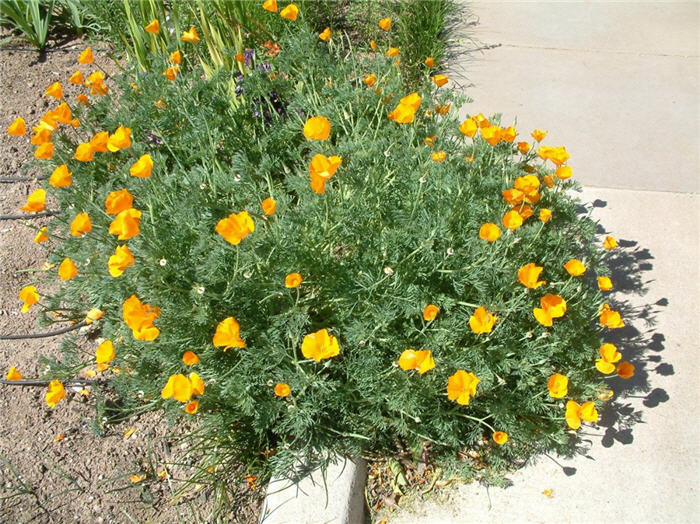| Botanical Name: Eschscholzia californica | |
| Common Name: California Poppy |

-
Anatomy
-
Culture
-
Design
Plant Type
Perennial, Annual
Height Range
Under 1'
Flower Color
Gold, Orange, Yellow
Flower Season
Spring
Leaf Color
Grey Green
Bark Color
n/a
Fruit Color
n/a
Fruit Season
n/a
Sun
Full
Water
Low
Growth Rate
Fast
Soil Type
Sandy, Rocky
Soil Condition
Average, Poor, Well-drained, Dry
Soil pH
Neutral
Adverse Factors
n/a
Design Styles
English Cottage, Meadow, Mediterranean, Ranch, Spanish
Accenting Features
Showy Flowers
Seasonal Interest
Spring
Location Uses
Perennial Border, Parking Strip, Parking Lot, Raised Planter, Roadside, With Rocks
Special Uses
Filler, Mass Planting, Fire Resistant, Naturalizing, Small Spaces
Attracts Wildlife
n/a
Information by: Stephanie Duer
Photographer: Steve Mullany
Photographer: Steve Mullany
-
Description
-
Notes
California poppies are delightful, bushy plants with silky, four-petaled, cup-shaped flowers in shades of yellow, orange, and red. The flowers open on sunny days, and only last a day, but the plant blooms profusely in spring to early summer. Foliage is green-grey and deeply cut, nearly ferny in appearance. Plants may grow 8 to 20 inches tall, depending on the variety.
Prefers sandy, poor, gravelly soils that are very well drained. Grow in full sun. A perennial, it is treated as an annual here as it isn't cold hardy. However, if in the right place it will reseed with abandon and poppies will abound year after year. They do not transplant well, so starting from seed is the best means of adding this to your garden.